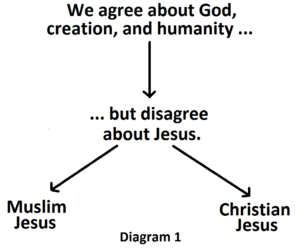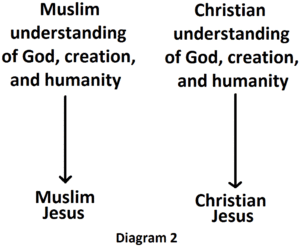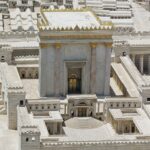In this penultimate instalment of TGCA’s seven part series on the Image of God (see part 1, part 2, part 3, part 4, part 5), Samuel Green highlights the significance of the Jewish/Christian idea of the Image of God, for discussion with Muslims.

A common mistake Christians make when talking to Muslims about the divinity of Jesus is to start at Jesus. We assume that Christians and Muslims agree about God and humanity, and only differ when it comes to Christ, and so we argue about him (diagram 1). These conversations tend to go round and round.
However, Christians and Muslims have completely different concepts of God and humanity, and the relationships between them. It is these differences that lead to a different understanding of Jesus (diagram 2).

If we want to explain the divinity of Jesus to a Muslim we need to start by talking about who God is and what it means to be human. We need to address these assumptions first, then we can move to the person of Jesus. The doctrine of the image of God is one of the key doctrines that does this.
Humanity in the Bible
The doctrine of the image of God teaches that God has made a connection between humanity and himself: Humans represent God’s rule in creation (Gen. 1:26), are to display his character (Lev. 19:2, Ps. 82), and are to share in his glory (Gen. 2:9, 3:22, Ps. 8). This connection is an important foundation for the incarnation.
God made us to represent him, and display his character and glory, but these goals have been thwarted. Sin stops us achieving these things ourselves: we fail to rule as we should; we do not display God’s character; and so do not share in his glory. Yet what we have failed to do God promises he will do for us through the divine man of Daniel 7. This Son of Man will bring God’s rule, display God’s character, and share in God’s glory (Dan. 7:13-14), and he will do this for God’s people (Dan. 7:27). This is what Jesus fulfils.
Humanity in the Qur’an
However, in the Qur’an, and popular Islamic belief,[1] there is no image of God; no connection between God and humanity; and there is no plan for humanity to share in God’s glory. This means Christians and Muslims have a completely different understanding of how God relates to humanity, what humanity is, and what God’s plans for humanity are. This is why the incarnation is illogical to a Muslim, but logical – yet still amazing – to a Christian.
Therefore, the image of God is an important doctrine to discuss with Muslims, and to come to some sort of agreement before you discuss the person of Jesus.
But why should a Muslim believe this doctrine? Why should you believe it and not follow Muhammad instead?

Muslims should believe in the image of God because it is the message of all the prophets and not one man. It is spoken about directly or indirectly throughout the Law of Moses, the books of the Prophets, the Psalms, and the books of the Gospel. It is not a Christian idea. It did not begin with Christianity. What Christians believe about God and humanity comes from all of the prophets. Muslims claim to believe all the prophets, though the Qur’an only contains what Muhammad said, and the image of God is the consistent message of the prophets. This is why everyone should believe in the image of God.
Some possible points of discussion:
- Do you know what the Bible contains? Explain how it contains many prophets over a 1500 year period, and that what Christians believe comes from reading all the prophets not one man.
- Show that all the prophets teach that we are made in the image of God. Ask what they think Christians understand by this. Then engage with what they say.
- Is there a connection between us and God? If they say no then explain there must be some connection: God gives us life and controls our affairs; God speaks and we can understand what he says; God listens to our prayers. If God is only transcendent then none of this is possible; there must be some connection. The image of God is part of this connection that God has made.
- Show Bible verses which show that when we live the holy life we display God’s character to the world.
- Bring it all together with Jesus. Explain how in Jesus God expresses himself to us as a man. God does this through the connection he himself has made.
[1] There is a Sunni hadith (record of Muhammad’s life and teaching) about Adam being made in Allah’s image 30 meters tall, but this hadith seems to have little theological impact for popular Islam.















